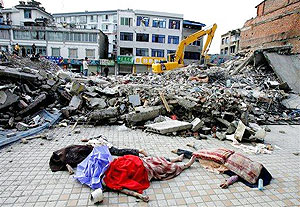Editor, Last night, at around 1.50 am, I sensed an ever so slight earth tremor. It was very brief and not ‘earth-shattering’. I distinctly felt the furniture and ground below me as well as the walls around me ‘tremble’. Given the recent events in Haiti, one is bound to start asking oneself whether Rwanda is prepared for such an eventuality. Granted, it is obvious that we are not situated in an area whereby earthquakes, hurricanes and typhoons, as well as floods are endemic.


Editor,
Last night, at around 1.50 am, I sensed an ever so slight earth tremor. It was very brief and not ‘earth-shattering’. I distinctly felt the furniture and ground below me as well as the walls around me ‘tremble’.
Given the recent events in Haiti, one is bound to start asking oneself whether Rwanda is prepared for such an eventuality. Granted, it is obvious that we are not situated in an area whereby earthquakes, hurricanes and typhoons, as well as floods are endemic.
Furthermore, related incidents in the very recent past, here in Rwanda, have illustrated that we do have experts in this field. After the earthquakes that occurred about a year or two ago in Nairobi, Kigali and Cyangugu among other areas, the public was alerted (by radio and by word of mouth) that an additional tremor would be felt at around 11.30 pm. This was soon after the disastrous tremor that occurred in Cyangugu.
Accordingly, later that night at around the predicted time, a very minor tremor was felt within Kigali.
Nonetheless, Kigali does lie at one of the north-western tips of the Rift Valley, if I’m not mistaken. A certain expatriate working in Kigali once told me that Kigali’s position in relation to the Rift Valley makes it predisposed to earthquakes. However, the degree of this vulnerability is to be questioned.
This being the case, it would be useful to know whether the national Land Authorities, be it the concerned Ministry, or ministerial agency, or Kigali City Council have actually established a Disaster Preparedness system.
A Disaster Preparedness Resource Centre, for example, would be a suitable place for the public including researchers, journalists and students, to consult. Depending on its fundraising capacity, such a Resource Centre could organise seminars and workshops to discuss strategies for disaster preparedness as well as for educating the public.
Esther Milenge


